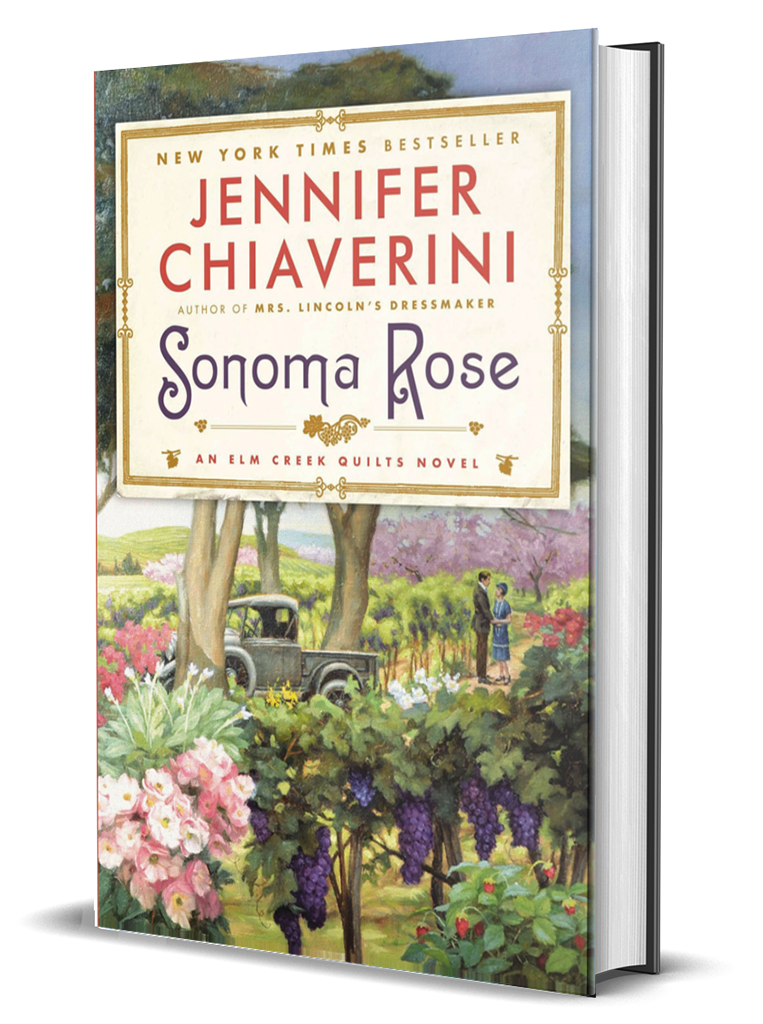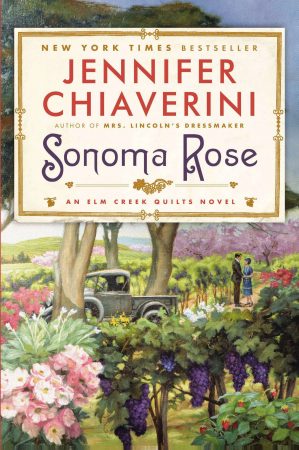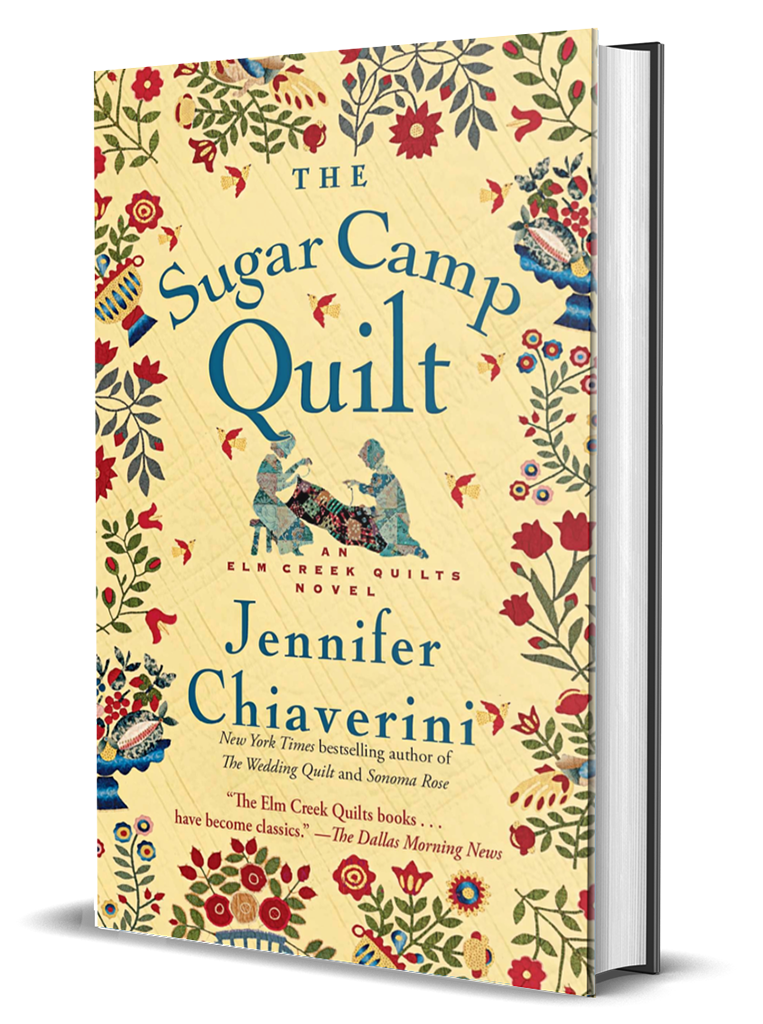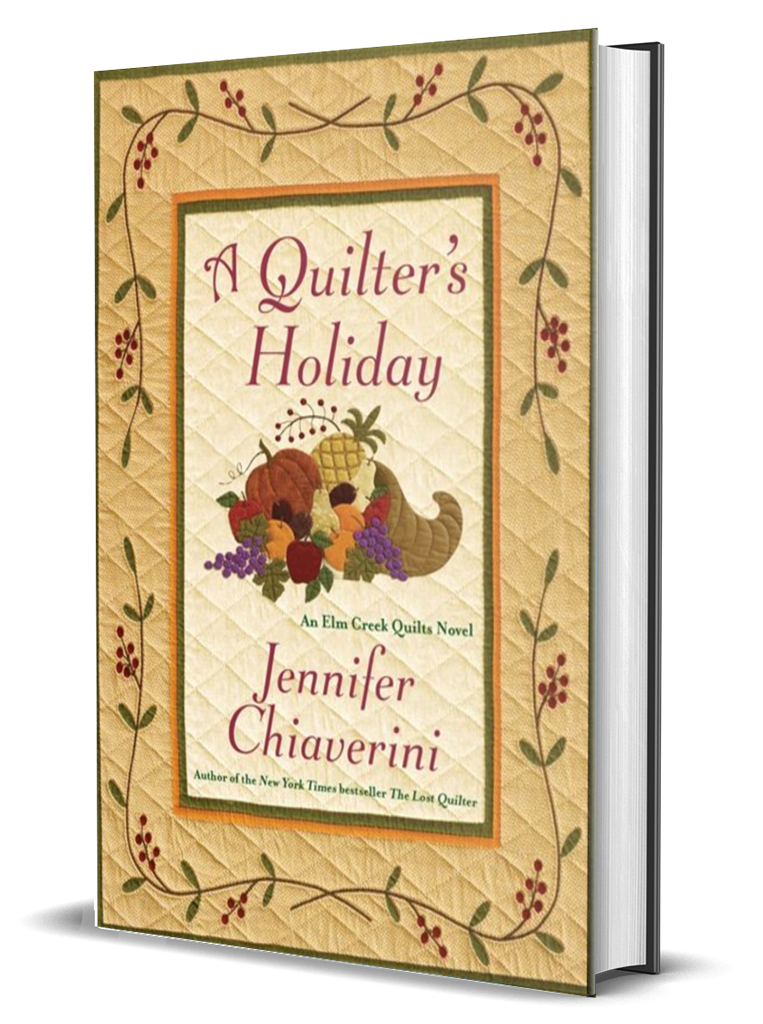
Sonoma Rose
“Chiaverini has an impressive ability to bring a time and place alive, showcasing the effects of Prohibition on farmers in Sonoma Valley.” — Romantic Times
“[An] emotionally compelling tale.” —Chicago Tribune
“Chiaverini does an excellent job of describing the lush landscapes of California wine country, while simultaneously painting a touching portrait of the difficulties faced by farming families who must tend to one another, as well as the earth.” —Publishers Weekly
As the nation grapples with the strictures of Prohibition, Rosa Diaz Barclay lives on a Southern California rye farm with her volatile husband, John, who has lately found another source of income far outside the Federal purview.
Mother to eight children, Rosa mourns the loss of four who succumbed to the mysterious wasting disease currently afflicting young Ana and Miguel. Two daughters born of another father are in perfect health. When an act of violence shatters Rosa’s resolve to maintain her increasingly dangerous existence, she flees with the children and her precious heirloom quilts to the mesa where she last saw her beloved mother alive.
As a flash flood traps Rosa and her children in a treacherous canyon, only one man is brave—or foolhardy—enough to come to their rescue: Lars Jorgenson, Rosa’s first love and the father of her healthy daughters. Together they escape to San Francisco, where a leading specialist offers beneficence far greater than this physician’s oath, directing them to a family farm where the children can convalesce while the adults work the harvest of luscious grapes.
Yet even in rural Sonoma County, safety continues to elude the fugitives. New identities offer scant protection from Rosa’s vengeful husband, the police who seek her for questioning, and the gangsters Lars reported to Prohibition agents—officers representing a department often as corrupt as the mob itself.
Drawn to the plight of local winemakers whose honest labors at viticulture have, through no fault of their own, become illegal, Rosa aspires to learn their craft. Ever mindful that his youthful alcoholism provoked Rosa to spurn him, Lars nevertheless supports Rosa’s daring plan to stake their futures on a struggling Sonoma County vineyard.
Rich with the vibrant detail of one of America’s most storied eras, Sonoma Rose is a novel of passions – for love and work and family – that yields a generous bounty.
Praise for Sonoma Rose
Read an Excerpt from Sonoma Rose
Clad in the faded apron she had sewn from a cotton feed sack, Rosa sat at the foot of the kitchen table sipping a cup of coffee and planning her day while her husband bolted down his bacon and eggs. Sitting quietly side by side on her left, twelve-year-old Marta and Lupita, almost five, ate their oatmeal in silence, sneaking furtive glances at each other or at Rosa but avoiding John. Rosa couldn’t blame them. She didn’t like to draw his attention either.
John wiped his mouth, pushed back his chair, and stood. “I’m going out.”
“When will you be back?” She knew as soon as she spoke that the question was a mistake.
“Why?” he asked, immediately suspicious. “Are you planning to have company?”
“Not unless someone comes for their mail.” John was the postmaster for the entire Arboles Valley and ran the post office out of their front room. Residents from the small town a few miles to the west and neighbors from nearby farms might stop by at any time throughout the day to post letters or pick up the bundles of envelopes and catalogues Rosa tied up with twine for them. “I only wanted to know when I should have your lunch ready.”
“I won’t be back for lunch.”
The girls incautiously brightened, but John had already left the kitchen and didn’t glimpse their sudden smiles. The front door squeaked open and banged shut, and a few moments later, Rosa heard John’s roadster roar to life in the garage. She listened for the sound of gravel churning beneath the new tires as he pulled out, and for the sound of the engine fading as he sped away. Only then could she take a deep breath and feel the tension leave her face and neck and shoulders. Even the kitchen windows seemed to let in more of the warm California sunshine in her husband’s absence, and the breeze that had felt clammy and oppressive as she served him his breakfast seemed newly refreshing as it carried ocean mists over the Santa Monica Mountains to the small adobe farmhouse on the mesa where Rosa had lived since her wedding day. Even after thirteen years of marriage and eight children, four of whom still lived, the adobe felt more like John’s home than theirs together.
As soon as only birdsong and the wind drifted through the open windows, Marta and Lupita began planning their Saturday adventures in earnest. “Mamá, do you think Ana will feel good enough to play today?” asked Lupita.
Rosa glanced down the hallway toward the bedroom where her middle daughter slept fitfully in the bedroom with Miguel, who at two years old was still her baby. “I don’t know, mija. I hope so.”
She hoped so every morning, but far too often, Ana could do little more than sit on the front step and smile as she watched her sisters play beneath the orange trees. She had become so accustomed to her illness that she had long ago forgotten to be jealous.
Rosa’s anger rose, sharp and sudden. John insisted he had no money to spare to search for a better doctor for Ana and Miguel, one wise and skilled enough to cure them of the terrible affliction that had already taken the lives of four of their brothers and sisters, and yet he had enough to waste on that ridiculous roadster, a lavish, impractical, and frivolous expense for a rye farmer in the rural Arboles Valley. When John first brought it home, beaming proudly through the open top, he demanded that Rosa go for a ride with him. “I will never set foot in that machine,” Rosa declared, “unless it’s to take Ana and Miguel to Oxnard or Los Angeles to see a new doctor.”
“I’ve told you,” said John, his dark blue eyes narrowing. “We can’t afford it.”
“We can’t afford it now,” she retorted, gesturing to the car angrily—and then she reeled as he struck her across the face.
In the weeks that followed, Rosa decided that the only good to come of John’s extravagance was that the roadster took him away from home, and kept him away for hours at a time on errands he did not bother to explain. As the harvest approached, the rye fields lay forgotten beneath the September sun, except when Lars Jorgensen—her childhood sweetheart and dearest friend until she married John—tended them for Rosa and the children’s sake. They would not starve, thanks to Lars’s kindness, but if John had mortgaged the farm to pay for that roadster, what would become of them when the bill came due?
As much as Rosa despised the roadster, sometimes she was tempted to lift the keys from John’s coat pocket while he slept, steal out into the night with the children, help them into the car, and speed away, far, far away where John would never find them. But there the dream came to an abrupt halt, because she knew that escape alone was not enough to ensure the children’s safety. Where would they go? How would they live? What could she do to keep a roof over their heads, clothes on their backs, and food in their tummies? The litany of questions always led to the same bleak conclusion: She had nowhere to go, no money, no means to provide for her children. And she was certain John would pursue them no matter how great a distance separated them. He would not relent. If Rosa ran off with the children, she could never stop running. John would want her back, even though he no longer loved her. He would want the children back, even those he surely suspected were not his.
Ana and Miguel woke by mid-morning to a day that had turned overcast and breezy, with a metallic taste in the air that hinted at coming rain. While Marta and Lupita played outside, Rosa tried to entice Ana and Miguel to eat by drizzling honey on their biscuits and promising them a story if they each ate a little. Miguel turned his head away every time she brought the fork close to his mouth, but Ana bravely took a few bites and glowed when Rosa praised her. Rosa had saved the best of the milk for them, but no sooner had they drained their cups than it all came back up again—milk, biscuits, honey, everything. After Rosa cleaned them up and helped Ana change into a fresh blouse, she asked Ana to mind her little brother while she cleaned the floor. Tearfully Ana apologized for the mess, wiping her eyes with her sleeve as she held a restless Miguel on her lap.
“It’s all right, mija,” Rosa assured her, on her hands and knees with the rag and bucket of soapy water. “It’s not your fault.”
Drawn by the sound of Ana’s sobs, Marta darted into the adobe with Lupita close behind. “What’s wrong?” asked Marta, eyeing the scene from the doorway before hurrying to take Miguel from Ana.
“Breakfast didn’t agree with them,” replied Rosa as calmly as she could manage, but Marta caught her eye, and she saw her own worry reflected in her eldest daughter’s face. At twelve, Marta had seen two younger brothers and two sisters waste away, and she knew as well as Rosa did that not one of them had reached their sixth birthday. At eight years old, Ana had endured the affliction longer than any of her siblings. Sometimes Ana’s refusal to succumb gave Rosa hope that Ana might yet survive to adulthood. More often, Rosa feared that each passing day brought Ana closer to the end. Miguel, who had fallen ill shortly after his second birthday, was much weaker than his sister and probably would not reach his third birthday.
Quickly Rosa turned her head away and closed her eyes to hold back her tears. If she gave in to her grief and anger, she might never stop weeping. She must not let the children know how close she had come to despair.
While Rosa finished cleaning the floor, Marta took charge of her younger siblings, carrying Miguel on her hip as she led her sisters outside. When Rosa went to empty the bucket, she spotted the children in the shade of the barn playing school—Ana’s favorite game, one she could play while seated and without tiring herself. Although her sisters preferred to run and dance, they indulged her, knowing Ana longed to attend the Arboles School with them. She had for a single year, but when she began missing too many days, the teacher suggested that it would be best if Rosa kept her home.
“But Ana is so bright,” Rosa had protested. “She loves to learn. Her heart would break if we didn’t let her go to school.”
“The long day exhausts her,” the teacher had gently replied. “And some of the other parents . . . are concerned.”
She didn’t need to elaborate. Rosa had already lost three children by then, and the Barclay children’s mysterious illnesses had become the source of much speculation and suspicion throughout the valley. Rosa was well aware of the rumors, the whispered conversations that fell silent when she approached neighbors and former friends in the grocery store. She knew some parents warned their children not to play with her girls, and entire families changed pews if the Barclays sat next to them in church. There had even been talk of moving the Arboles Valley Post Office from the Barclays’ front room, but since John was postmaster and no one wanted to spend the money to build a new post office, the grumblings eventually faded. Rosa told herself that her neighbors did not mean to be unkind, that it would be difficult not to be suspicious, even fearful, when so much misfortune had beset their family. But understanding her neighbors’ fears did not mean giving in to them, especially when her daughter’s happiness was at stake.
“The other students are in no danger,” Rosa had replied tightly. “Marta and Lupita are with Ana every day, and they haven’t fallen ill.”
“I’m not agreeing that their fears are reasonable, but either way, Ana would be far better off at home with you. And for your sake—” The teacher hesitated. “In the years to come, won’t you regret every moment you didn’t spend with the poor dear?”
Rosa’s throat closed around a retort, and without another word, she gathered up her girls and took them home. She taught Ana herself after that, going over Marta’s old lessons in reading, math, and spelling at the kitchen table. Some days Ana was too weary to study, but when she was strong enough, she absorbed every lesson with quiet, solemn purposefulness, as if she were determined to learn as much as possible in the brief time fate would grant her.
She rarely studied anymore, and when she was too tired to hold up a book, Marta read to her. “If I grow up, I want to be a librarian,” she told Rosa dreamily one evening as Rosa tucked her in. “Think of all those books. Think of reading all day long, every day.”
“I think there’s more to being a librarian than reading all day,” said Rosa, with a catch in her throat. She longed to assure Ana that of course she would grow up, that it was nonsense to think she might not, but Rosa wouldn’t lie, and Ana wouldn’t believe her if she did.
While the children played outside, Rosa made the beds, brought in the laundry from the line, and tended her garden. Gray clouds filled the sky from west to east, so she worked quickly, spurred on by the threat of rain. At noon she called the children in for lunch—corn tortillas and rice with fresh tomatoes and mild peppers, with water to drink, since they had no more milk. Miraculously, Ana and Miguel kept the food down, but the nourishment failed to invigorate them, so Rosa put them down for a nap while Marta and Lupita played with dolls in the front room.
She was tidying the kitchen when she heard an automobile approaching—not the smooth purr of John’s roadster but the rattle and growl of an older and far more welcome vehicle.
Quickly she smoothed her hair back from her face and snatched off her soiled apron. When a knock sounded on the door, she hastened to answer it only to find Elizabeth Nelson standing on the doorstep, a tan cloche with a jaunty upturned brim upon her bobbed blonde curls. Behind her, Rosa glimpsed the Jorgensens’ car parked near the garage, but Lars was nowhere to be seen.
Rosa quickly quashed her disappointment. Elizabeth, a newcomer to the Arboles Valley, had flouted local custom by befriending her, undeterred by her children’s strange sickness and John’s sarcastic malice. She and her husband, Henry, had moved to the Arboles Valley a few months before, carrying with them the photographs and maps of the thriving cattle ranch they believed they had purchased from a land agent back in Pennsylvania. When they came to the post office to pick up the deed of trust, they discovered that they had been swindled. Triumph Ranch did not exist—or rather, it had once, but Rosa’s great-grandparents had sold it to the Jorgensen family long ago and the old Spanish name had all but faded into memory. Suddenly penniless, the Nelsons found work as hired hands on the Jorgensen ranch, and ever since, John had never missed an opportunity to mock Elizabeth when she came to the post office to collect letters addressed to Mrs. Henry Nelson of Triumph Ranch. Apparently Elizabeth would rather endure his jeers than admit to her family back in Pennsylvania that she and Henry had been cheated out of their life savings.
Before Rosa could greet her, Elizabeth’s pretty features drew together in concern. “What’s wrong?”
“Nothing.” When Elizabeth looked dubious, Rosa quickly amended, “Nothing new. Nothing that hasn’t been wrong for a very long time.” She opened the door wider and beckoned Elizabeth inside. “Please come in while I get your letters.”
Marta and Lupita glanced up warily when Rosa led Elizabeth into the front room, but they quickly recognized the pretty young farmwife with the blonde bob, so after returning her bright smile with bashful grins, they returned to their play.
Rosa left them and went to retrieve the Nelsons’ and Jorgensens’ mail from the kitchen. Although John bore the title of postmaster and collected the paycheck, Rosa sorted the mail and was most often the one who met the valley’s residents at the door when they came to collect their letters and parcels. Since purchasing the roadster, John had been too busy touring the countryside to pay any more attention to the daily mail than he did the ripening crops. The work had fallen entirely to Rosa, and as she sorted envelopes and boxes on the kitchen table in between tending children and folding laundry and preparing meals, she wished that she could claim John’s wages for herself. She couldn’t help tallying his income in her mind and calculating how many months he would have had to work, saving every dime, in order to purchase that loathsome automobile. How could he have amassed enough money unless he had mortgaged the farm?
Rosa had to know.
As soon as Elizabeth left, she would search John’s desk for bank documents. She had already checked the strongbox where they kept the deed to the farm and other important papers safe from brush fires and earthquakes, but of course he had not put any mortgage papers there, where she could easily find them. He would have put them somewhere out of sight, someplace where she wouldn’t accidentally discover them while dusting or putting away clothes.
Rosa brought the bundles of letters back to the front room and gave them to Elizabeth, who thanked her and added, “I found something in the cabin that belongs to you.”
The ramshackle cabin on the Jorgensen ranch? Rosa had visited it many times, long before the Nelsons had made it their home, but she had always been careful to leave nothing behind. Bewildered, Rosa waited while Elizabeth took the mail out to Lars’s car and returned with two folded quilts—but Rosa knew she had never left any quilts at the cabin.
While Rosa, Marta, and Lupita looked on, Elizabeth set one quilt on the sofa and began to unfold the other. Rosa glimpsed homespun plaids and wools in deep blues and dark barn reds and forest greens, sturdy and warm—and suddenly she recognized the pattern. With an eager gasp, she reached out to take the bottom corners of the quilt, lifting them so the quilt unfurled between her hands and Elizabeth’s. The quilt was comprised not of square blocks but of hexagons, each composed of twelve triangular wedges with a smaller hexagon appliquéd in the center where the points met. The quilt had been well used and well loved, with tiny quilting stitches outlining each piece and many more arranged in concentric curves so the hexagons resembled wagon wheels in motion. The slight shrinkage of the wool and batting in the wash throughout the years had created a patina of wrinkles all over the quilt, and Rosa could almost imagine she knew each one by heart.
“Dios mío,” she murmured.
“It is your great-grandmother’s, isn’t it?” prompted Elizabeth. “I recognized it from the photograph you showed me.”
“Without a doubt, it is hers.” As Rosa’s gaze traveled over the quilt, long-forgotten memories came alive—her grandmother in a rocking chair, the quilt tucked around her lap. Rosa and her younger brother, Carlos, draping the quilt over a table and pretending it was a tent high in the Santa Monica Mountains. Climbing beneath it and snuggling up to her mother after fleeing to her parents’ bedroom in the dark hours of the night, frightened awake by nightmares. Yes, she knew the quilt intimately. “It is just as I remember it.”
“Almost but not exactly,” said Elizabeth. “It needed some mending. I matched the fabric as best as I could when I replaced worn pieces.”
Rosa smiled, touched by her friend’s thoughtfulness, pained by the realization that it had been a long time since anyone had shown her such kindness. “Then it is even lovelier than I remember.” She sat down in a rocking chair, draped the quilt across her lap, and ran her hands over it. The fabric had softened with age, the colors mellowed, but it was no less beautiful. “I remember my mother cuddling me in this quilt when I was a little girl no bigger than Lupita. My great-grandmother made it when she was a young bride-to-be in Texas. Her parents had arranged for her to marry my great-grandfather through a cousin who lived in Los Angeles. The first time she saw him was the day he came to San Antonio to bring her back to El Rancho Triunfo.”
“Triumph Ranch,” said Elizabeth.
“Yes, and for many years the name rang true.” Rosa could almost hear her grandmother’s voice as she remembered her stories of days gone by, so full of happiness and sorrow, joy and disappointment. “They raised barley and rye. One hundred head of cattle grazed where the sheep pasture and the apricot orchard stand today. But my family lost everything in a terrible drought, the worst ever to strike the Arboles Valley. Every farm in the valley suffered. Some families sold their land after the first summer without rain, but by the time my great-grandparents decided to put El Rancho Triunfo up for sale the following year, there were no buyers. My great-grandparents sold all the cattle to slaughterhouses rather than let them starve. They were thankful and relieved when Mrs. Jorgensen’s grandfather bought the ranch and permitted them to remain on the land in exchange for their labor. The rains fell two months later. My great-grandparents never forgave themselves for not holding out a little while longer, for giving up too soon and accepting less than the land was truly worth.”
“They never forgave the Jorgensens either,” said Elizabeth carefully, “or so I’ve heard.”
“That is also true.” The elder Rodriguezes had passed their anger on to their children, who had passed it on to Rosa’s mother, Isabel. Isabel had mourned the loss of the land all her life, and she had resented the Jorgensens from the time she was a young woman until she took her last breath. Her enmity extended even to the Jorgensen descendants, who had nothing to do with the sale of El Rancho Triunfo.
Rose stroked her great-grandmother’s quilt in wonder while Elizabeth unfolded the second quilt and held it up high by the corners so that only the bottom edge touched the floor. “It’s lovely,” Rosa said, wondering why Elizabeth believed the wrinkled, faded quilt belonged to her. Instead of the dark homespun plaids and wools of the hexagon quilt, it had been pieced from a variety of cottons, satins, and other fabrics that looked to be decades more recent. Rosa admired it politely, but she soon felt her gaze drawn back to her great-grandmother’s quilt. She could hardly believe she held it once more, and she could not imagine how it had come to be in the dilapidated old cabin on the Jorgensen ranch, especially knowing how her mother had felt about the Jorgensens. The last time Rosa had seen the quilt, it had been spread upon her parents’ bed in her childhood home.
“I call this quilt the Arboles Valley Star.” Elizabeth folded the second quilt in half with the pieced top showing and draped it over the sofa. “I found it with your great-grandmother’s. Don’t you recognize it?”
Although Rosa didn’t, she examined it more carefully for Elizabeth’s sake. The complex, intricate pattern resembled the traditional Blazing Star in that each segment of the eight-pointed stars was comprised of four congruent diamonds, but the smaller diamonds fanned out in a half star in the four corner squares of each block, giving the quilt the illusion of brilliance and fire. Great care must have gone into the making of each block for the divided stars to fit the corners exactly so. Few quilters had the patience for such painstaking work, and she knew only one personally—her late mother. But Rosa had never seen this quilt among her mother’s collection.
“I’ve never seen it before,” she finally admitted, reluctant to disappoint Elizabeth. “I suppose I could look through the album and see if it appears in any of my family’s photographs, but I’ve looked at them so many times. I think I would have recognized this quilt if it were in any of them. It seems too new for my great-grandmother’s handiwork.”
“I thought you had made it.”
“Me?” Rosa shook her head. “Why would you think that?”
“Because of this.”
Elizabeth turned over the quilt and showed Rosa a square of lace-trimmed satin appliquéd to the back. Upon the square, a wreath of needlepoint rosebuds surrounded a pair of intertwined initials embroidered in silk—R. D. and L. J.
For a moment, Rosa could only stare in stunned amazement at the letters, but then she tentatively touched her fingertips to the embroidered monograms. R.D. for Rosa Diaz, her maiden name. And L.J. could refer only to—
“What is it?” Elizabeth asked, concerned. “Do you remember the quilt now?”
“No,” Rosa replied, bewildered. “I’ve never seen this quilt, but I—I do know this embroidery. This is my mother’s work. She made these stitches. And this satin and lace. It came from Ana’s baptismal cap.”
Ana’s baptism, a day that should have been full of joy, had been shrouded in grief, following soon after the death of Rosa’s firstborn son. Though John had banished Isabel from the Barclay farm, he was unaware that she had come to the church to share in her granddaughter’s holy day. But Rosa had known her mother would attend, just as she had attended her other grandchildren’s christenings.
After the ceremony, Rosa spotted her mother at the back of the church, standing in a darkened alcove and disguised by a heavy black veil, and she felt a pang of gratitude and shame. Her mother shouldn’t have to lurk in the back of the church at her granddaughter’s baptism; she should have sat proudly in the first pew, as John’s mother had done, as was a grandmother’s privilege. Trailing behind the others as they left the church, Rosa drew the quilt over Ana’s head to protect her from the cold November rain, and as she did, she gently swept off Ana’s soft satin cap, trimmed in lace to match her baptismal gown, and let it fall to the floor of the vestibule behind them. Rosa knew her mother would keep it, recognizing it not only as a memento of the blessed occasion but also an apology for all that Isabel had been denied that day—and had been in days past, and would be in years yet to come.
“But—why? And—when?” How had the pure white satin of Ana’s christening cap come to appear in this unfamiliar quilt embroidered with Rosa’s initials and Lars’s—Lars, the man whose family Isabel had despised, the man Isabel had forbidden her to marry? Rosa swiftly turned the quilt over and studied the pieced stars, running her hands over the patches until her fingers came to rest on a piece of ivory sateen that was wondrously, painfully familiar. “This was from her wedding gown. I know it. And this—” She touched a triangle of pink floral calico. She could never forget the soft cotton print she herself had sewn so lovingly. “This was from the dress Marta wore on her first day of school. But how did my mother come to have it? I don’t understand. Where did you find this quilt?”
“Both quilts were in an old steamer trunk in the cabin,” said Elizabeth. “On the Jorgensen farm, where your family once lived. I assumed your grandmother had forgotten the older quilt there when they moved out, but as for the newer—”
“Oh, no, no. They left nothing behind. The homespun-and-wool quilt was in my mother’s home all my life. It never left her bed. But this star quilt—” Rosa looked from one quilt to the other, thinking. “My mother must have taken the quilts to the cabin and left them there. But I don’t understand—” Suddenly Rosa grew very still, and all at once, she knew. “She wanted me to have them. And she could not bring them to me here.”
“Why not?”
“My husband would not allow my parents on his property, not even to visit their grandchildren. When I wanted to see my mother, we had to meet on the mesa. Once a week, when John went to pick up the mail from the train station, I would take the children to see her. You know the place.” Everyone knew the story; everyone knew the place her mother had dearly loved, the place where she had slipped and fallen to her death. The authorities had declared it a suicide, but Rosa knew it must have been a terrible accident. Isabel never would have desecrated the place where they and the children had enjoyed brief moments of happiness.
“Rosa,” said Elizabeth warily. “The day your mother died—were you supposed to meet her on the mesa?”
“I was, but she didn’t know that I could not come. A few days before, John had returned home with the mail and found me and the children gone. I–I had to tell him where we had been.” Involuntarily, Rosa touched her left shoulder, the one he had dislocated when he forced the truth from her. “After that, he varied his schedule so I never knew when he would be gone or how soon he would return. I was never able to meet my mother again.” Her hands tightened around the quilt, her mother’s last gift to a penitent and sorrowful daughter. “I can’t help but think of her waiting for me, waiting and waiting, every week without fail, hoping I would come. I can’t help but imagine her despair when I never appeared. Perhaps she thought she would never see her grandchildren again. Perhaps—perhaps I’ve been fooling myself all these years, telling myself her death was an accident.”
Elizabeth’s eyes were wide and apprehensive. “Perhaps you were.”
Rosa looked up sharply and read the fear written on Elizabeth’s face. “No. No. I know what you’re thinking. I can’t believe it.”
It was unimaginable—but was it any more likely that her mother had accidentally fallen from a place she knew so well or that she had taken her own life? John had known that Isabel had waited faithfully for Rosa and the children on the mesa on the days he drove to the train station for the mail. He had known that she waited alone.
“Mamá?” said Lupita in a small, high voice full of fear.
With a start, Rosa remembered her daughters. “Marta, go and see if Miguel and Ana are still sleeping, would you, please?” she said. “Take Lupita with you.”
Reluctantly, Marta did as she was told. The girls had been gone only a moment when Rosa heard the familiar, dreaded roar of John’s roadster as it sped up the gravel road and braked hard in front of the adobe. Elizabeth looked out the window in alarm, but Rosa, strangely calm, folded her mother’s quilt, set it aside, and stood. She was on her feet when the door burst open and John stormed in.
“Where is that son of a bitch?” John’s sharp gaze scanned the room, alighting on Elizabeth for a moment before moving on. “I know he’s here.”
“No one else is here,” said Rosa. “Only Elizabeth.”
John shoved Rosa aside and strode into the kitchen. Rosa heard the table overturn and glass shatter, and then he appeared in the doorway again, his eyes ablaze with fury. “I saw his car.”
“I drove it,” said Elizabeth. “I work for the Jorgensens.”
“Did you come to help my dear wife plan the birthday party?” The glare John shot Rosa over his shoulder was full of anger, betrayal, and pain—a deep, deep hurt that must be avenged. “Lupita turns five next week, did you know that?”
Rosa could not breathe. Marta’s birth only seven months after their marriage had raised John’s suspicions, but he had drowned out Rosa’s confession with his demands that they never speak of it again. He coveted Rosa, and silence was the price he paid for keeping her as his wife. In the years that followed, the other children Rosa had borne after Marta had fallen ill before their fifth birthdays—except for Lupita, whose continued good health was, in John’s eyes, a mockery of his willingness to forgive Rosa’s first betrayal.
“I just came for the mail,” said Elizabeth steadily. She could not know the significance of Lupita’s age, the reason for John’s fury.
John threw her a look of utter contempt and strode off toward the children’s room in the back of the adobe. At the sound of Lupita’s cry of fear, Rosa drew in a shaky breath and gripped the back of the rocking chair so hard her knuckles turned white. Elizabeth put her arm around Rosa’s shoulders, but quickly released her when Rosa flinched from the pain of pressure on her recent injuries. Sometimes John remembered to be careful about hitting her only where her clothes would conceal the evidence.
Without warning John returned. Rosa drew back but not quickly enough to evade his grasp. He seized her by the shoulders and shook her. “Where is he?”
“I don’t know,” Rosa choked out, fighting for breath. “He’s not here.”
Elizabeth tried to put herself between them, but John knocked her to the floor. She grabbed for the rocking chair as she fell, but her hands slipped and her head struck the floor. Rosa turned to help her, but John seized her by the upper arm and punched her full-force in the face—once, twice, a third time. Her ears rang and her vision grayed over, and just when she felt herself slipping into darkness, John flung her down, kicked her in the side, and left her sprawled on the floor. Over the sound of blood pounding in her ears, she heard the door slam and the roadster roar to life. Somewhere nearby, Elizabeth groaned. Rosa lay on the floor fighting for breath, gritting her teeth to hold back cries of anguish and pain, listening in vain for the children. They were so quiet. She hoped they had hidden themselves. Especially Marta and Lupita—they would be the next targets of John’s rage. When he returned—
“Are you all right?” said Elizabeth shakily as she clutched the arm of the rocking chair and pulled herself to her feet, her blonde curls in her face.
Rosa felt blood and tears trickling down her face, and one of her molars was loose, but she managed a nod. “The children.” Gasping from pain, she hurried to the children’s room and found Marta standing defiantly in front of Miguel’s crib, one arm around each of her sisters.
“I hate him,” Marta said, fighting back tears. “I hate him. I hope he never comes home.”
“Oh, mija.” Rosa’s composure shattered. Fighting back sobs, she placed her hands on Marta’s face and kissed her on the forehead before hurrying back to the front room to assure Elizabeth that the children were safe, for now. “John’s going after Lars. I’m sure of it.”
“You shouldn’t be here when he returns,” said Elizabeth. “Gather the children and come with me. You can stay in the cabin with me and Henry.”
Rosa shook her head. “It’s not safe. We’ll have to pass John on the way.”
“Then take a room at the Grand Union Hotel. Carlos will look after you.”
“No.” Rosa knew not even her brother could protect her from John’s vengeance. “I know a better place. A place my husband fears.”








